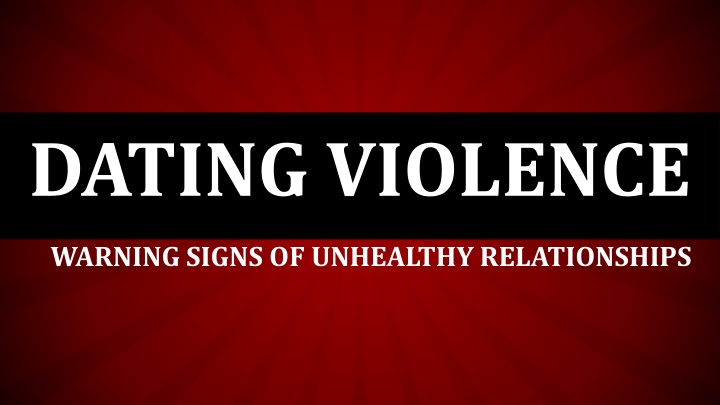
Recognizing Signs of Unhealthy Relationships: Dating Violence, Sexual Harassment, and Abuse
Learn about warning signs like dating violence, sexual harassment, and types of abuse in relationships. Discover how to address sexual harassment and understand the statistics on teen dating violence. Be aware of relationship red flags to prevent potentially violent situations.
Download Presentation

Please find below an Image/Link to download the presentation.
The content on the website is provided AS IS for your information and personal use only. It may not be sold, licensed, or shared on other websites without obtaining consent from the author. If you encounter any issues during the download, it is possible that the publisher has removed the file from their server.
You are allowed to download the files provided on this website for personal or commercial use, subject to the condition that they are used lawfully. All files are the property of their respective owners.
The content on the website is provided AS IS for your information and personal use only. It may not be sold, licensed, or shared on other websites without obtaining consent from the author.
E N D
Presentation Transcript
DATING VIOLENCE WARNING SIGNS OF UNHEALTHY RELATIONSHIPS
SEXUAL HARASSMENT Any unwanted conduct or communication of a sexual nature that negatively affect a person s relationships, employment opportunities or environment. Harassment may be verbal or physical.
EXAMPLES OF SEXUAL HARASSMENT Name Calling Threats Inappropriate Jokes Spreading Rumors Gestures/Leers Writing on Bathroom Walls Grabbing Pushing Cornering Unwanted Kissing/Touching Inappropriately touching body
HOW TO DEAL WITH SEXUAL HARASSMENT Let the person know that you are uncomfortable with their behavior. Tell them to stop. Be assertive. Tell someone you trust: parent, relative, coach, teacher, counselor, etc. Keep a recordof the harassment to show what s been happening. If you see or suspect something, say something!
TYPES OF ABUSE Physical: Can begin with threats of violence, punching fist through wall, escalates to pushing, slapping, restraining, etc. Finally, it can become life threatening. Sexual: Any non-consensual, forced sexual behavior. It may escalate to rape or sexual assault. Emotional/Psychological: Mental violence that can include constant verbal threats and abuse, harassment, excessive possessiveness, isolating abused person from others, damage of personal property, intimidation, etc.
DATING VIOLENCE A pattern of behavior to establish power and control over another person through fear and intimidation often including the threat or use of violence. It occurs when one person believes they are entitled to control another person and those involved are in an intimate or close relationship.
STATS ON TEEN DATING VIOLENCE 1 in 4 teens will be in an abusive relationship 1 in 8 teens will experience physical violence in a dating relationship. 80% of assaults include pushing, shoving, slapping and grabbing. Victims and abusers come from all different social and economic backgrounds.
RELATIONSHIP RED FLAGS WARNING SIGNS OF A PARTNER WHO IS OR MAY BECOME VIOLENT Wants to get serious quickly Will not take NO for an answer Is overly jealous and possessive Wants to choose their partners friends and activities Is controlling and bossy (makes all the decisions)
RELATIONSHIP RED FLAGS Puts partner down when alone and in front of others Makes partner feel guilty If you really loved me you would Blames the victim for behavior It s your fault I get so angry. But, then apologizes I ll never do it again, I promise. Has strong ideas about gender roles.
WHY TEENS STAY Embarrassed or ashamed Afraid violence will escalate if they try to end the relationship Convinced it s their fault No experience with healthy dating relationships Confuse jealousy with love Ignore reality don t know they re being abused
WHY TEENS STAY Afraid friends and family won t believe them Feel like there is no one they can turn to for support Mix of good times and hope that partner will change Believe that being involved with someone is the MOST important thing in their life better to be with someone than to be alone
WHAT SHOULD YOU DO? If you or someone you know is in an abusive or unhealthy relationship... TELL SOMEONE! Parents, friends, trusted adult, teacher, counselor, police, professional mental health worker.
